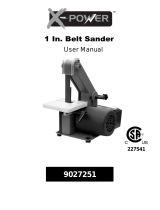
4
IMPORTANT SAFETY
INSTRUCTIONS
Warning
As with all machines, there is a certain amount
of hazard involved with the use of this sander.
Use the machine with the respect and caution
demanded where safety precautions are
concerned. When normal safety precautions are
overlooked or ignored, personal injury to the
operator can result.
Read, understand and follow the safety and
operating instructions found in this manual.
Know the limitations and hazards associated
with this machine.
Electrical grounding. Make certain that the
machine frame is electrically grounded and that
a ground lead is included in the incoming
electrical service. In cases where a cord and
plug are used, make certain that the grounding
plug connects to a suitable ground. Follow the
grounding procedure indicated in the National
Electrical Code.
Eye safety. Wear an approved safety shield,
goggles, or glasses to protect eyes. (NOTE:
Common eyeglasses are only impact-resistant,
they are not safety glasses.)
Personal protection. Before operating the
machine, remove tie, rings, watch and other
jewelry and roll up sleeves above the elbows.
Remove all loose outer clothing and confine long
hair. Protective type footwear should be used.
Where the noise exceeds the level of exposure
allowed in Section 1910.95 of the OSHA
Regulations, use hearing protective devices. Do
not wear gloves.
Guards. Keep the machine guards in place at
all times when the machine is in use. If removed
for maintenance purposes, use extreme caution
and replace guards on completion of the
maintenance task before operating the sander.
DO NOT operate the machine with the guards
off except for the belt end guard which swings
away to allow for contour sanding. Keep that
guard in place except when contour sanding and
swing it back into position immediately after
completing the contour sanding task.
Work area. Keep the floor around the machine
clean and free of scrap material, saw dust, oil
and other liquids to minimize the danger of
tripping or slipping. Make certain the work area
is well lighted and that a proper exhaust system
is used to minimize dust. Powermatic
recommends the use of anti-skid floor strips on
the floor area where the operator normally
stands and that each machine’s work area be
marked off. Provide adequate work space
around the machine.
Don’t use in dangerous environment. Do not
expose sander to rain or use in damp locations.
Keep children away. All visitors should be kept
a safe distance from work area.
Make workshop child proof with padlocks,
master switches, or by removing starter keys.
Avoid accidental starting: Make certain motor
switch is in off position before connecting power
to the machine.
Operator position. Maintain a balanced stance
and keep your body under control at all times.
Do not over-reach. Do not stand in line with the
belt in the direction that it is moving when the
work stop is not in use.
Belt and Disc Direction. Avoid kickback by
sanding in accordance with the directional
arrows. Proper belt direction is from the idler
pulley towards the drive pulley. Proper disc
rotation is counterclockwise facing the disc.
CAUTION: Sand on the section of the disc from
the center to the left edge. DO NOT use the
right hand portion for sanding.
Housekeeping. Before turning on machine,
remove all extra equipment such as keys,
wrenches, scrap, and cleaning rags away from
the machine.
Careless acts. Give the work you are doing
your undivided attention. Looking around,
carrying on a conversation, and “horseplay” are
careless acts that can result in serious injury.
Disconnect machine before performing any
service or maintenance.
Hand safety. Keep fingers and hands away
from the belt or disc. DO NOT clear sawdust
from the table with the hands; use a brush. On
small or thin parts, use a push stick or jig to
keep the hands from contacting the abrasive. If
using the fence, avoid getting fingers too close
to the fence to prevent pinching. Never wear
gloves while operating the sander.




















